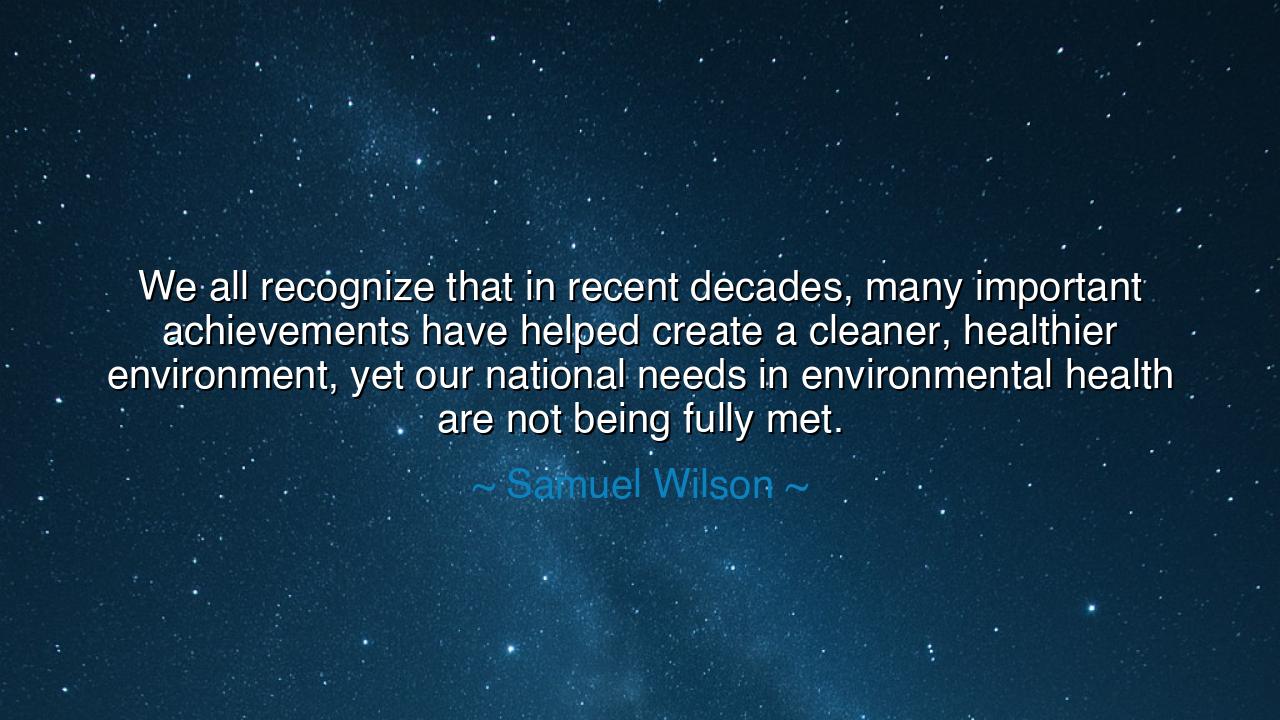
We all recognize that in recent decades, many important
We all recognize that in recent decades, many important achievements have helped create a cleaner, healthier environment, yet our national needs in environmental health are not being fully met.






The words of Samuel Wilson—“We all recognize that in recent decades, many important achievements have helped create a cleaner, healthier environment, yet our national needs in environmental health are not being fully met.”—are spoken with the calm authority of a man who stands between hope and warning. In his statement lies a dual truth: the recognition of human progress and the acknowledgment of its incompleteness. Wilson, a scientist and leader in environmental health, does not speak with despair, but with sober wisdom. He reminds us that while we may celebrate the triumphs of our age—the clearer rivers, the purer air, the awakening of ecological conscience—we must not mistake progress for completion. His words are both gratitude and a call to vigilance.
The origin of this quote reflects Wilson’s work as a former Director of the National Institute of Environmental Health Sciences, where he witnessed the growing awareness of environmental issues in the late 20th century. During his time, nations had already achieved great victories: the banning of lead in gasoline, the reduction of industrial emissions, the cleanup of toxic waste sites. Yet, Wilson saw what many refused to see—that beneath these surface victories, the deeper relationship between human health and environment remained fractured. The rivers might run clearer, but the invisible poisons—chemical pollutants, climate change, inequality—still flowed beneath. His words, therefore, are not a lament, but an appeal to look beyond statistics, to understand that the true health of a nation lies in its harmony with the earth.
To the ancients, this lesson would not have seemed new. The philosopher Hippocrates, father of medicine, once taught that health depends upon “the air we breathe, the water we drink, and the places we dwell.” He understood, as Wilson does, that man’s wellbeing cannot be separated from the world that sustains him. Yet, over centuries, humanity forgot this sacred connection. The Industrial Age brought abundance, but at the cost of balance. The forests were felled, the skies darkened, and the soil—once a cradle of life—became a vessel of decay. Wilson’s words recall the ancient teaching: that the earth and man are not two, but one, and that the illness of one is the illness of both.
History gives us vivid proof of this truth. Consider the London smog of 1952, when pollution so thick it blotted out the sun killed thousands in mere days. It was this tragedy that gave birth to modern air quality laws, sparking reforms around the world. And yet, decades later, new forms of pollution—plastic in the seas, carbon in the air—have taken its place. Wilson’s warning becomes clear: every generation must fight its own environmental battle, for the forces of neglect never truly vanish; they merely change form. The struggle for a healthier planet is not a campaign of years, but of centuries.
Yet Wilson’s words are not without hope. He recognizes that humanity is capable of transformation. The same ingenuity that built engines of destruction can build instruments of restoration. Science, guided by ethics, can heal what industry has harmed. But this healing requires more than policy—it requires consciousness. It demands that each citizen see environmental health not as a distant issue for governments to solve, but as a daily responsibility woven into the choices we make: what we consume, what we waste, how we live. In his wisdom, Wilson implies that the environment is not just the air and water outside us—it is the invisible web of life within us all.
There is also a moral resonance in his words. For when he says our “national needs are not being fully met,” he speaks not only of technological gaps, but of spiritual neglect. We have learned to purify rivers but not our greed; to recycle waste but not our indifference. The truest environmental reform, Wilson suggests, must begin in the human heart. Only when compassion for the earth becomes as natural as breathing will our progress be complete. To heal the world, we must see it not as resource, but as relationship—a living body of which we are a part.
The lesson, then, is clear and enduring: celebrate progress, but never grow complacent. Let each generation renew its vow to safeguard the earth, for no victory in environmental health is ever final. The forests still need tending; the oceans still need care; the air still waits to be made pure. Let us follow Samuel Wilson’s example—honest in praise, steadfast in responsibility. For the health of our planet is the health of our children, and the measure of our civilization will not be the monuments we build, but the world we leave behind.
So let these words endure as a gentle warning and a noble summons: our journey toward a cleaner, healthier world is not finished—it has only just begun. And though we have done much, we must do more, for the earth, like the human spirit, demands constant renewal. Let us walk forward with humility, with courage, and with reverence for the sacred truth Samuel Wilson understood so well—that to care for the environment is not a duty apart from life; it is the essence of life itself.






AAdministratorAdministrator
Welcome, honored guests. Please leave a comment, we will respond soon